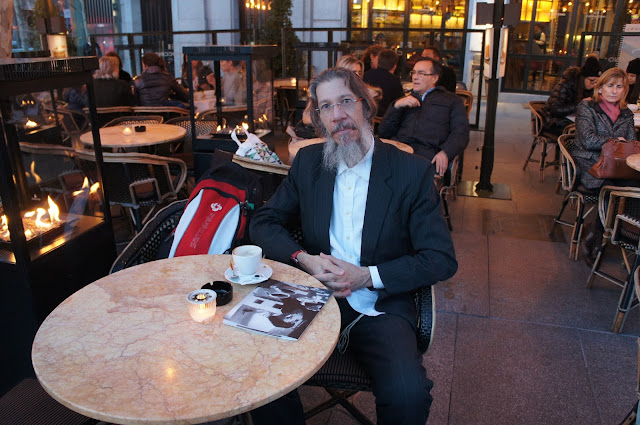JACOB JR, MY JEWISH WORLD. Jewish emancipation, RELIGIOUS, POLITICAL AND HUMAN
Shalom! World.
Jewish emancipation, RELIGIOUS, POLITICAL AND HUMAN
Night of Jewish thought and I am struck by a literary memory of Karl Marx "To the Jewish question." Moved by the influence of Bruno Bauer, brilliant student of Hegel and a professor of theology at Berlin, Marx approaches Bauer at the time it leaves the course for Philosophy of Law (finished in 1841). Bauer's influence and point of resistance to Marx. Yes, but you have to see this introduction to the topic? Ask that person away from philosophical paths, but I'll explain: there were two views to be accepted by both Bauer and Marx on the Jewish question.
Initially, Bauer notes that in Prussia, emancipation (the Jews) is not feasible: it is the religious character (non-secular or non-atheist) the rule that prevents the emancipation and therefore the existence of real citizens, in a word a Christian state one is emancipated. Then, it is irrelevant that the Jews, keeping themselves as Jews (ie, preserving their religious convictions), claiming the Christian state what they themselves do not - namely, that the State fails to require a religious affiliation to the exercise of rights. For Bauer, the Jews' claim that the state waives its requirement and provided religious legitimacy and would only make sense if the Jews, in advance, to give up their own religious requirement and condition. Moreover, insofar as it keeps as Jews, the Jews are excluded from the human community: autoisolam on the scale that you consider and identify themselves as a chosen people, a privilege. Bauer dismisses the plight of Jews in favor of emancipation. However, he goes further in disqualification of the Jews when discussing their own possibilities of emancipation.
Faithful to the inspiration of Hegel, Bauer considers Christianity a religion of universal character, which contrasts sharply to the particular character of Judaism, glued to the Mosaic Law, the Christian universalism would be potentially much more able to access that Judaism emancipation. That is, according to their religious particularism, the Jew is less able to emancipate the Christian. Bauer's solution, however, does not imply that the Jewish convert to Christianity to sue the State Christian civic and political equality (more precisely, the political emancipation). It implies, rather, that both - Christians and Jews - to renounce their religion in favor of an illustrated rationalism and idealistic. Bauer's treatment gives the "Jewish question", without prejudice to their political significance, is therefore a religious treatment - he considers first and foremost, a religious issue: indeed, for Bauer, the religious condition for the emancipation political emancipation.
The decisive factor for Marx is to qualify and determine the emancipation that is at stake. Marx argues that the political emancipation, contrary to what Bauer says, is not directly subject to the emancipation of religion (and demonstrates, using the example of the ongoing story, with references to France and the United States of America) more: emancipation politics, legitimized by a secular state - that is a state not professing any religion, a state that does not recognize as no official religion - does not mean the emancipation of men in relation to religion.
Shifting the problem of the religious realm to the political, Marx focuses on the institution of the state and its analysis is developed in the verification of the factual unfolding modern social order (bourgeois: the state as an expression divested of the general interests and civil society, the real space of particularism (realm of empirical life and private). According to Marx, the political state behaves precisely towards civil society in a way so as spiritualist heaven for the earth. This is the same opposition to her, her triumphs in the same way religion (trumps) the constraint profane as he also has to recognize it, set it up again (there also) that let itself be dominated by it. The man, in his closest reality, civil society , is a being profane. Here where he asserts himself and others as real individual - a phenomenon is not true. In the State, to the contrary - where the man is worth as a generic - it is the member of imaginary an imaginary sovereignty, is robbed of his real individual life and filled with a university unreal.
All emancipation policy is the reduction of man, on the one hand, the member of civil society, the individual selfish self: on the other hand, the citizen and moral person. The political emancipation that Marx considers undoubtedly a breakthrough, a breakthrough, a victory of the revolution (the bourgeois) that destroyed the Old Regime - is not, therefore, human emancipation. Only when the individual man resumes in himself the abstract citizen, and as individual man - in his empirical life, in their individual work in their individual relationships has become a generic being, only when man has recognized and organized its forcespropes how social forces and thus no longer separates itself from the social force in the figure of strength and only then is human emancipation accomplished.
The human emancipation, far transcends the political emancipation, will be the program of communism - social order that inaugurates the true human history and marks the end of human prehistory.
Lehitraot bekarov,
Jacob Jr.



Comments
Post a Comment